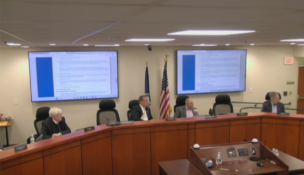VCU Massey Cancer Center wins $3.3M grant for lung cancer research center
Center will focus on disproportionate effects of lung cancer in Black community
VCU Massey Cancer Center wins $3.3M grant for lung cancer research center
Center will focus on disproportionate effects of lung cancer in Black community
The Virginia Commonwealth University Massey Cancer Center won a $3.3 million Specialized Program of Research Excellence (SPORE) grant to establish a research center on lung cancer disparities from the National Cancer Institute last week.
The Translational Research Center in Lung Cancer Disparities (TRACER) will study the disproportionate effects of lung cancer on the Black community. The center will be based at the VCU Massey Cancer Center and led by Massey, collaborating with the Medical University of South Carolina (MUSC) Hollings Cancer Center and City of Hope in California. After the three-year funding period of this initial award, the center can apply for a larger, five-year SPORE award.
TRACER will speak with local health departments, community health centers, civic activists, education institutions and others in Virginia, South Carolina and California.
“It’s important that the community has a seat at the table. We’re optimistic that this dream team of researchers and community stakeholders will translate our basic science into clinical impact in reducing lung cancer disparities,” TRACER principal investigator Dr. Robert Winn, director and Lipman Chair in Oncology at Massey and senior associate dean for cancer innovation and professor of pulmonary disease and critical care medicine at the VCU School of Medicine, said in a statement.
TRACER will investigate how stress and smoking interact with gene expression to raise lung cancer risk for Black men. Although the racial gap in lung cancer cases appears to be closing, likely due to the success of anti-smoking campaigns, Black men still have a higher risk of developing lung cancer compared to white men, even though they tend to smoke less – an effect referred to as the “Black smoking paradox,” according to an article published by the Cancer Network. Black patients are also more likely than white patients to be diagnosed at later stages and to receive no treatment at all for their cancer, according to a data analysis from the North American Association of Central Cancer Registries running from 2013 to 2017.
Winn will co-lead the project with Dr. S. Patrick Nana-Sinkam, who is a member of Massey’s Cancer Prevention and Control research program, the Linda Grandis Blatt Endowed Chair in Cancer Research and the chair of the pulmonary disease and critical care medicine division of the VCU School of Medicine.
“It’s no secret that the Black community faces higher levels of stress, compared with more socioeconomically advantaged groups,” Nana-Sinkam said in a statement. “We want to understand how environmental stress, smoking and biology intersect to increase lung cancer risk.”
The center’s second project will investigate how the stress hormone cortisol relates to racial differences in smoking behaviors and overall lung cancer risk. The project will be led by Chanita Hughes-Halbert, an adjunct at MUSC and a vice chair for research at the University of Southern California’s Keck School of Medicine and the associate director for cancer equity at the USC Norris Comprehensive Cancer Center.
s


















